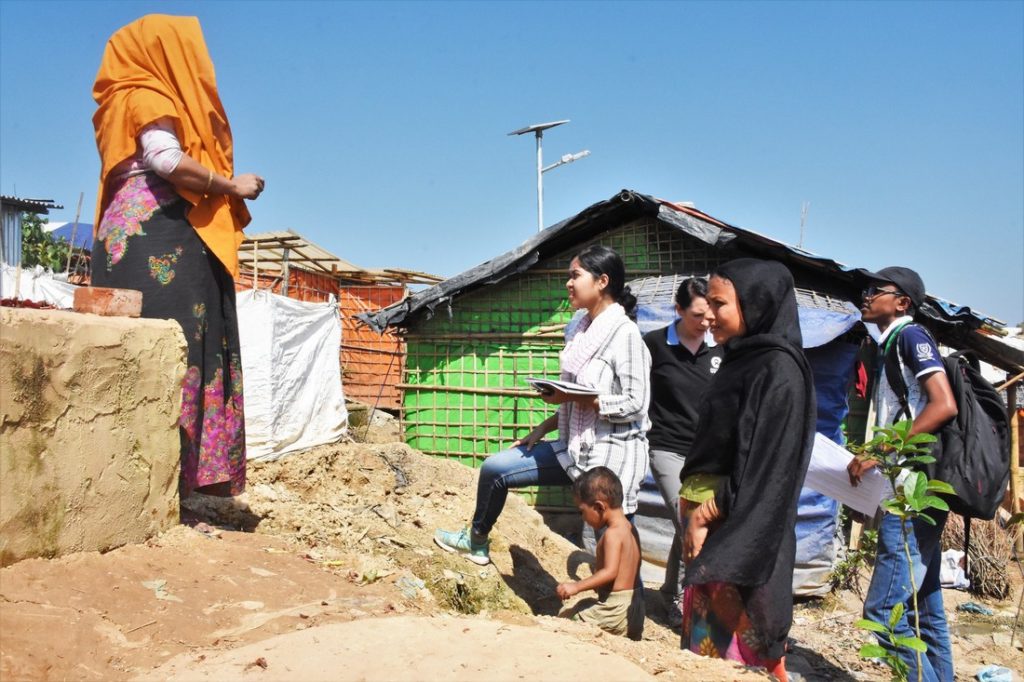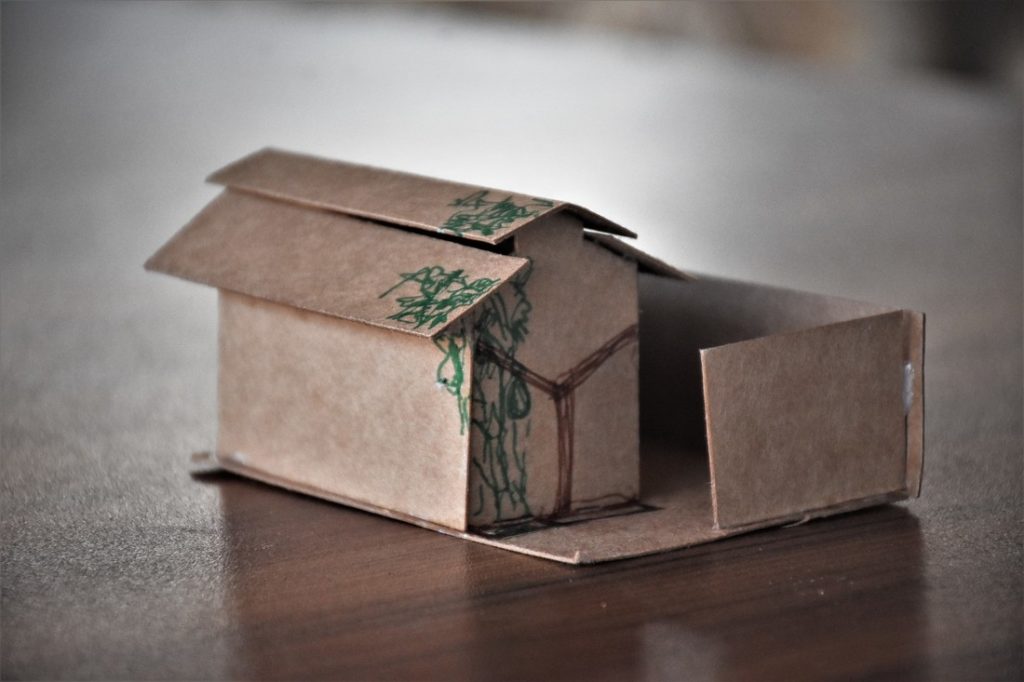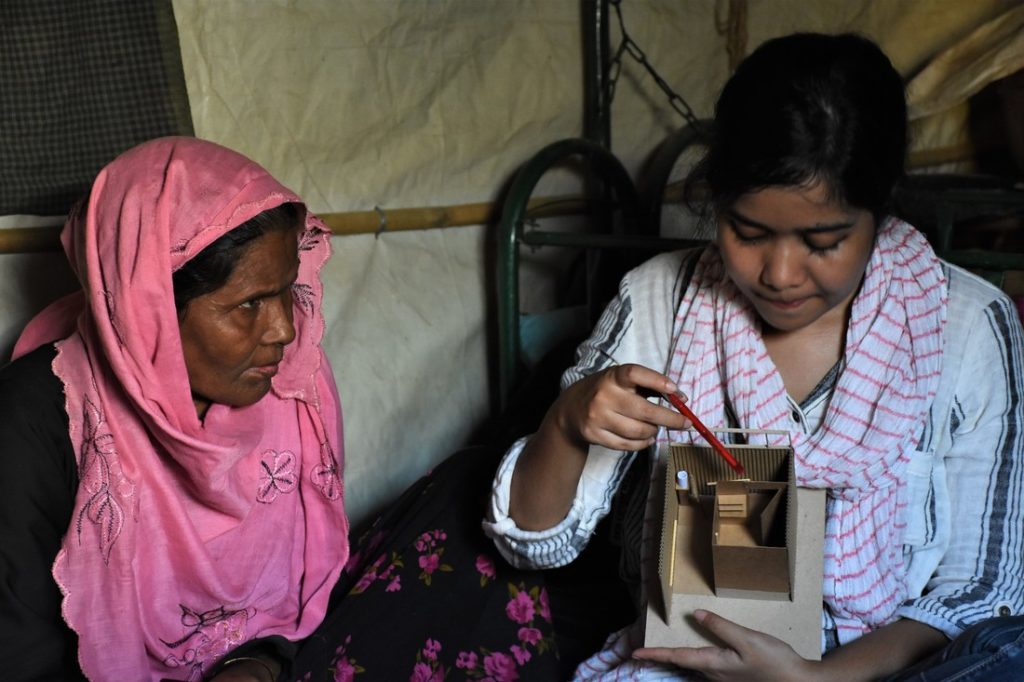Designing hygiene and sanitation facilities in Rohingya refugee camps: for women by women
In this post, we learn about how much of a difference it makes in the lives of women and girls when we listen to their lived experiences and apply their wisdom.
“When I showed the women the model, the oldest lady in the room took it in her hand and took a close look for a few seconds. Then she looked at me and nodded her head positively and with a big smile. That’s when I got my answer that I might have done something right! That moment will stay with me for a long time.”
Nuha, a Bangladeshi architect, worked with Oxfam in Rohingya refugee camps in Cox’s Bazar last fall. She spoke with local women to design improved hygiene and sanitation facilities, getting their feedback on models and sketches of their ideas to create safer latrines.

Rohingya refugees are consulted for the design of safe toilets in Cox’s Bazar, Bangladesh. Credit: Maruf Hasan/Oxfam
Together, they have been working on inclusive new designs for toilets, showers and laundry areas, that put refugees’ needs at the centre of the design process. Given the challenges of the hilly terrain and threat of mudslides and how tightly packed the camps are, finding suitable space to build toilet and washing facilities had proved extremely challenging.
“I was nervous when we went to show the community the design. I was worried that I had missed an element they needed. I decided to make a model big enough to give them an idea of how the latrine would look. ”
Currently, facilities may not meet the needs of all refugees. Research conducted by Oxfam and partner agencies in April 2018 found that a third of women did not feel safe or comfortable going to collect water or using toilets and shower cubicles – many of which lack a roof and a lockable door.
In emergencies, we meet urgent needs to save lives, but also look at long-term solutions to restoring women’s livelihoods, health, safety and leadership. Women are often left out of critical decisions that affect them, like how food, water, and medicine are distributed, and even where to build the toilets.

Oxfam has been collaborating with female architects and Rohingya refugees to improve toilet and washing facilities for women and girls living in the world’s largest refugee camp. Credit: Maruf Hasan/Oxfam
“I’m interested in design processes that include community participation.” explains Nuha. “Working with the refugees has taught me the impact of smaller details that can make big difference. I hope that the women and girls feel proud of their design.”
Nearly a million Rohingya people have fled violence in Myanmar and are living in crowded refugee camps in Cox’s Bazar, Bangladesh. Oxfam is providing vital aid including clean water to help prevent outbreaks of disease, and food vouchers which can be exchanged for fresh ingredients at local markets. We are helping people to stay healthy by installing water points, toilets and showers, distributing soap, and talking about good hygiene. We have installed solar-powered lights and provided portable solar lamps so that refugees – especially women – feel safer leaving their shelters after dark.

Rohingya refugee women help design better and safer toilets. Credit: Maruf Hasan/Oxfam
Michelle Farrington, Oxfam’s Public Health Promotion Coordinator in Cox’s Bazar, said: “We knew from our research that we needed to adapt our existing designs to make the camp’s toilet and washing facilities more accessible for the women and girls and that’s where the architects came in. They helped enormously: bringing an architect’s eye to the new designs and ideas we’ve been developing with the refugee women. Their contribution to our project will hopefully mean that women and girls living in one of the most challenging places imaginable will be able to do something that most people take for granted: wash and go to the toilet safely.”
From August 2017 to January 2019, Oxfam has reached at least 266,000 Rohingya refugees in Bangladesh. Learn more about Oxfam’s response here.

